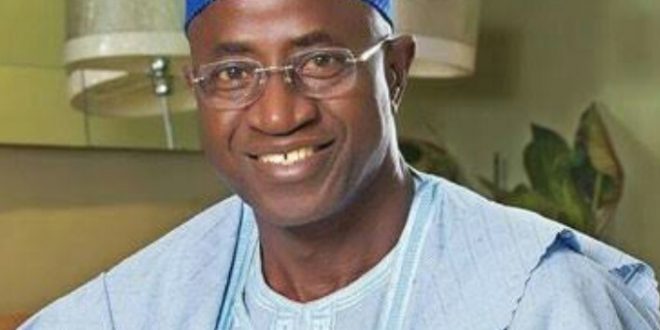It is a New Year.
It has been three whole weeks since the last time I wrote anything.
My political diary may have been silent but not so my journey.
There is a lot to report starting today.
I am breaking it up into the Past, the Present and the Future.
Let me start with the Past, a very distant past that tells its own story about who I am and where I am coming from.
I was 10 years old, a regular kid in a regular primary school in the city of Jos.
Every day of the week we played football on the wide empty untarred streets.
One day, we saw and touched and wore LIVE jerseys to play one of our regular inter-street matches.
One of us, Lucky, had brought 7 new jerseys from only-God-knows-where for our team to wear. Usually, one side would strip whilst the other would wear anything they had on to distinguish the teams.
On this day, we had jerseys to wear for the first time in our lives. We were on cloud-nine.
Then the match ended as the sun settled down and went to sleep. For some reason, Lucky would not take the jerseys to his house. The issue of who would keep them till the following day arose.
As one of the best players living close to the field, one of the kids suggested that I did.
Without thinking, I agreed and proudly carried the jerseys home. I was truly excited.
My father was in the parlour of our one-bedroom apartment at 64/5 Yandoka Street, Jos, sipping his regular evening Becks lager beer, when I arrived with my priced new items.
‘What are you carrying?’he asked as I came in, pointing at the jerseys in my hand.
‘Our jerseys’, I replied, excited.
‘Where did you get them from?’
‘It is Lucky that brought them to the field Sir. He told me to keep them till tomorrow’.
‘And you brought them home. Where did Lucky get them from?’he asked.
At this point I was beginning to feel that something was wrong and that I could be in some trouble.
‘I don’t know, sir’. I answered.
‘Wait there for me’, he announced, pointing at where I was standing with the jerseys still in my hands.
My father got up from his chair, went into his bedroom, and came out shortly dressed up to go out.
He beckoned for me to follow him.
I tried to put the jerseys somewhere in the room before following him but he said ‘no’, that I should bring them along. That’s when I started to sense trouble.
We walked up the street, he in front and I behind him, with the jerseys in both hands for the whole world to see.
We turned at the end of Yandoka Street, and headed towards Mosallachi Jumma Street where my Uncle, my father’s elder brother, lived. I knew then I was in trouble. If he was taking me to his brother, whom we all feared because of his strict ways, I must start to prepare my mind and my backside for some whacking. Papa Jos knew how to use the cane.
I started to tremble.
On our way, soon we had to pass by the Police Station near the magistrate courts adjoining the Palace of Chief Fom Bot, the traditional King of Jos.
As soon as we got to the front of the Police Station, my father held me by the shoulder, and gently pushed me into the station!
Police Station? That was the last thing on my mind. Police Station? No one except criminals went into police stations. My little mind was racing. The police were the most dreaded people in our lives. The fear of them is the beginning of wisdom.
Before I knew it, we were at the front desk. The officers on duty were stern-looking, wickedness written all over them. I was still carrying my load of jerseys. By this time the jerseys had become dead weight heavy. I wanted to drop them and flee!
I could still not work out what was happening.
Then my father released the bombshell.
‘This is my son’, he told the police officers who were glaring down at me, dread written all over me. ‘He came home this evening with these jerseys that he is carrying.I don’t know where he got them from. I did not buy them for him. He says his friend gave them for him to keep. Please help me find out’.
Then he was gone, leaving me in the hands of the most dreaded people in my world! They were only next to God in the ranking of those we feared.
My world ended that night. I broke down crying in fear of what would happen to me.
Between tears, I told them about Lucky and the jerseys.
They put me behind the counter.
Within a few minutes, as I stood there, in walked a crowd of people including Lucky, his parents, some neighbours and more policemen. Lucky was crying.
Between ceaseless wailing Lucky confessed he was the one that took the money his father had been looking for all day in the house. His father was so livid he started to rain kicks and slaps on his son right in front of the policemen who had to pull them apart. The police saved Lucky that night.
It took like forever before a policeman was deployed to take me back home.
My father and all my siblings were waiting for me as the policeman explained the situation to them. My father thanked him and proudly told him that he knew his son would never have stolen the jerseys. I was a happy boy again by the time the policeman left.
Shortly after the policeman left, my father went into his room and came out with the longest whip I have ever seen in my life. It was like a mile long. The whip started to fall on me as I dodged and flew in all directions with the whip chasing me. It took the intervention of many families in the neighbourhood to pacify my father.
That night I did not sleep a wink.
My father sat me down and, with the rest of my siblings pleading and crying on my behalf, delivered to the entire family his own ‘sermon on the mount’, a lecture that has remained with me ever since.
He told us about the standards expected of a person well-bred in the Yoruba tradition of the omoluabi, about the ills and consequences of covetousness, of stealing, of dishonesty, of cheating, of greed, of lies, of anger and impatience, and also explained to us the power in humility, in a good family name, honesty, decency, simplicity, integrity, service, good conduct always, patience, compassion and education. Oh, how he harped on education as the key to life.
That was how things were in those days. You could not take home what did not belong to you, or what you did not earn legitimately. People who did such things never became representatives and leaders in Yoruba communities. They were shunned, never respected and always treated with condescending scorn.
That lecture has remained with me all my life since then. I have also passed them on, through my actions mostly, down to my children.
I have worked hard all my life and earned every kobo I have ever made, legitimately.
How will I account to Nigerians the source of money they tell me I need (2-4 billion naira) to contest an election and to win in a foremost Yoruba State like Ogun State that deserves to be a paradise for all Black people on earth?
That is the billion Naira question I have to answer in ‘The Present’ tomorrow.
 Hottestgistnaija.com
Hottestgistnaija.com





